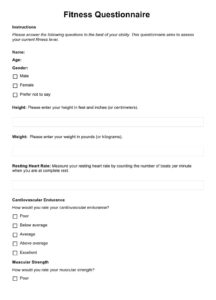A well-crafted personal training cancellation policy template is an essential tool for fitness professionals seeking to maintain a healthy client base and protect their business. This policy serves as a written agreement between the trainer and their clients, outlining the conditions and terms for canceling personal training sessions or contracts. By establishing clear expectations and procedures, both parties can avoid disputes and maintain a respectful and professional relationship.
A well-written cancellation policy should encompass several essential components, including:
- Notice period: This specifies the amount of time clients must provide before canceling a session or contract. This period can vary based on the type of service being provided and the trainer’s preferences.
- Cancellation fees: In some cases, trainers may charge a cancellation fee to cover administrative costs associated with processing cancellations or to compensate for lost revenue.
- Refund policy: This outlines the trainer’s policy on refunds for prepaid sessions or contracts. It should clarify whether refunds are available and under what circumstances.
- Make-up sessions: Some trainers offer make-up sessions for clients who need to cancel due to unforeseen circumstances. The policy should specify the conditions under which make-up sessions are allowed and how they are scheduled.
- Exceptions: The policy should outline any exceptions to the general cancellation policy, such as medical emergencies or other extenuating circumstances that may warrant a more flexible approach.
What to Include in a Personal Training Cancellation Policy Template
The specific details of a personal training cancellation policy template will vary depending on the unique circumstances of the trainer and their clients. However, certain key elements should be included in every policy to ensure clarity and fairness.
Notice Period
The notice period is the amount of time that clients must provide before canceling a session or contract. This period can vary based on the type of service being provided and the trainer’s preferences. For individual sessions, a notice period of 24 to 48 hours is common. For longer-term contracts, the notice period may be longer, such as one or two weeks.
Cancellation Fees
Some trainers may charge a cancellation fee to cover administrative costs associated with processing cancellations or to compensate for lost revenue. Cancellation fees should be reasonable and clearly stated in the cancellation policy. They should also be applied consistently to all clients.
Refund Policy
The refund policy outlines the trainer’s policy on refunds for prepaid sessions or contracts. It should clarify whether refunds are available and under what circumstances. For example, a trainer may offer full refunds for cancellations made within a certain time frame (such as 24 hours before a scheduled session) or partial refunds for cancellations made with less notice.
Make-Up Sessions
Some trainers offer make-up sessions for clients who need to cancel due to unforeseen circumstances. The policy should specify the conditions under which make-up sessions are allowed and how they are scheduled. For example, a trainer may allow make-up sessions for cancellations due to illness or work emergencies, and may require clients to schedule make-up sessions within a certain time frame.
Exceptions
The policy should outline any exceptions to the general cancellation policy, such as medical emergencies or other extenuating circumstances that may warrant a more flexible approach. For example, a trainer may waive the cancellation fee or allow a full refund for clients who cancel due to a medical emergency.
How to Create an Effective Personal Training Cancellation Policy
Creating an effective personal training cancellation policy template requires careful consideration and attention to detail. Here are some tips for developing a policy that is fair and beneficial to both trainers and clients:
Keep it Simple and Clear
The cancellation policy should be written in clear and concise language that is easy for clients to understand. Avoid using technical jargon or legal terminology that may be confusing or misleading.
Be Consistent
The cancellation policy should be applied consistently to all clients. This means that everyone should be subject to the same terms and conditions, regardless of their relationship with the trainer or the length of time they have been a client.
Be Reasonable
The cancellation policy should be reasonable and fair to both trainers and clients. The notice period, cancellation fees, and refund policy should be in line with industry standards and should not place an undue burden on either party.
Be Flexible
The cancellation policy should allow for some flexibility in cases of unforeseen circumstances. For example, a trainer may consider waiving the cancellation fee or allowing a full refund for clients who cancel due to a medical emergency or other extenuating circumstance.
FAQ
What is a personal training cancellation policy template?
A personal training cancellation policy template is a document that outlines the conditions and terms for canceling personal training sessions or contracts. It is designed to protect the interests of both trainers and clients by establishing clear expectations and procedures for cancellations.
Why is it important to have a personal training cancellation policy template?
Having a personal training cancellation policy template is important because it helps to avoid misunderstandings and disputes between trainers and clients. It ensures that both parties are aware of their rights and responsibilities and provides a clear framework for處理 cancellations.
What are some key elements that should be included in a personal training cancellation policy template?
Key elements that should be included in a personal training cancellation policy template include the notice period, cancellation fees, refund policy, make-up sessions, and exceptions. These elements help to ensure that the policy is fair and beneficial to both trainers and clients.
